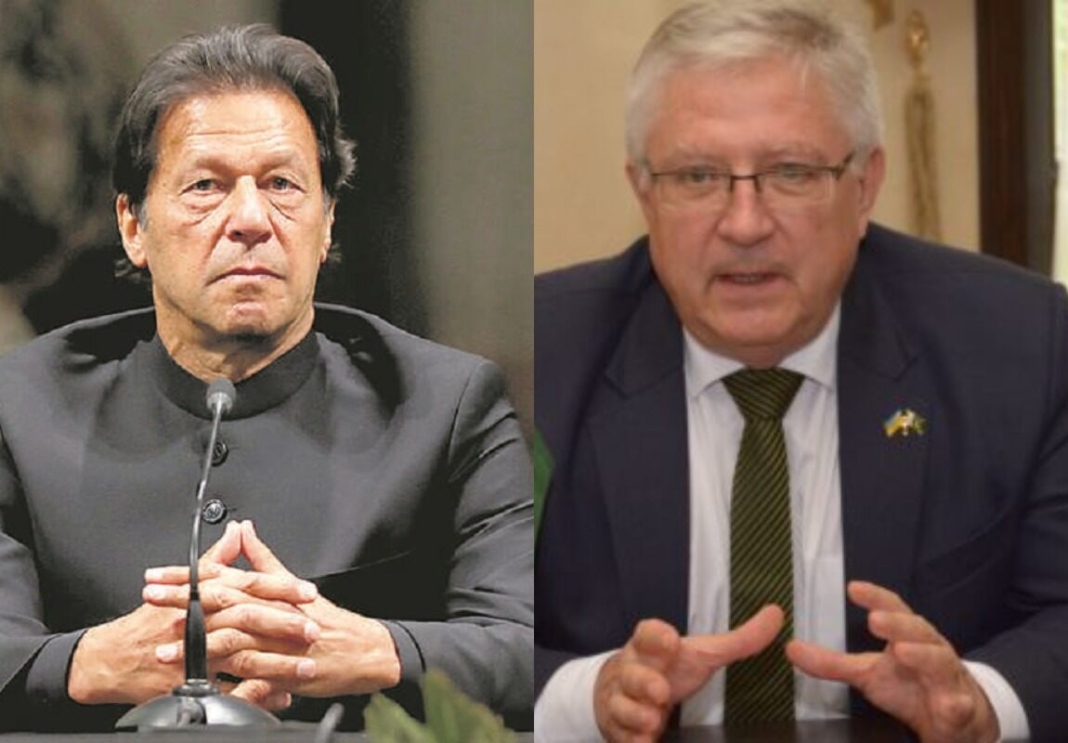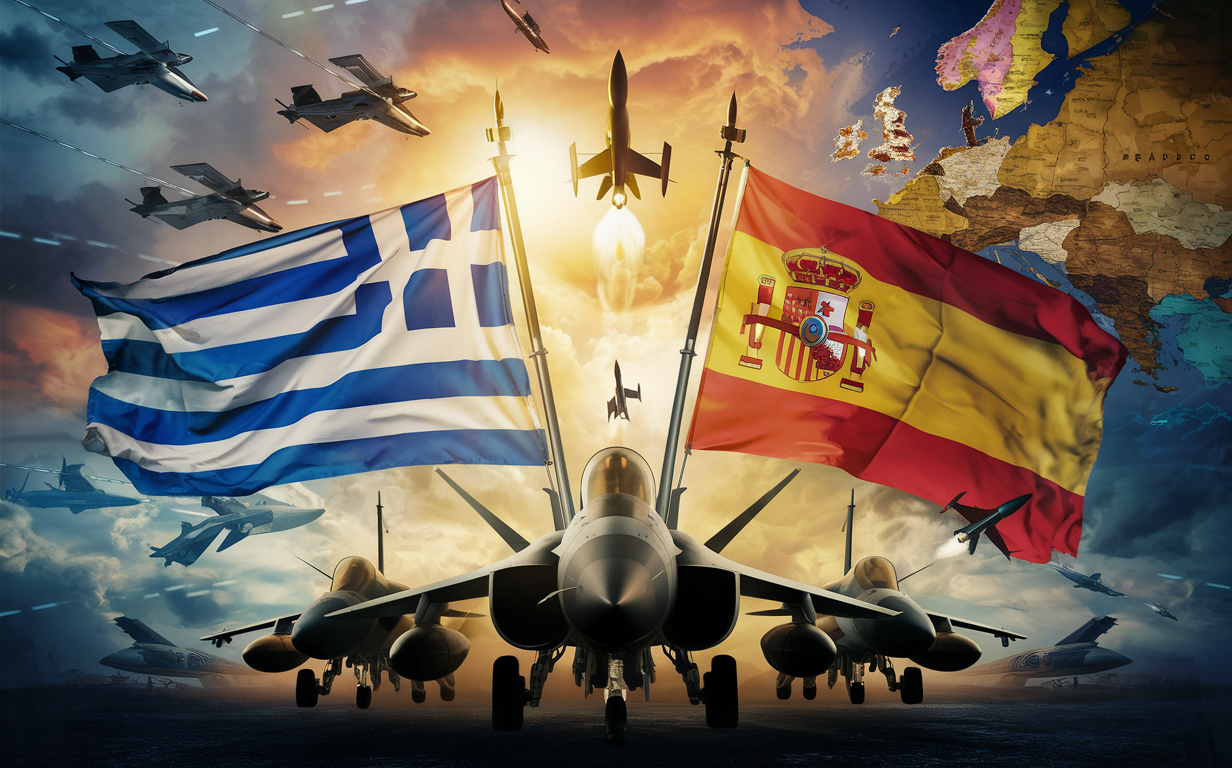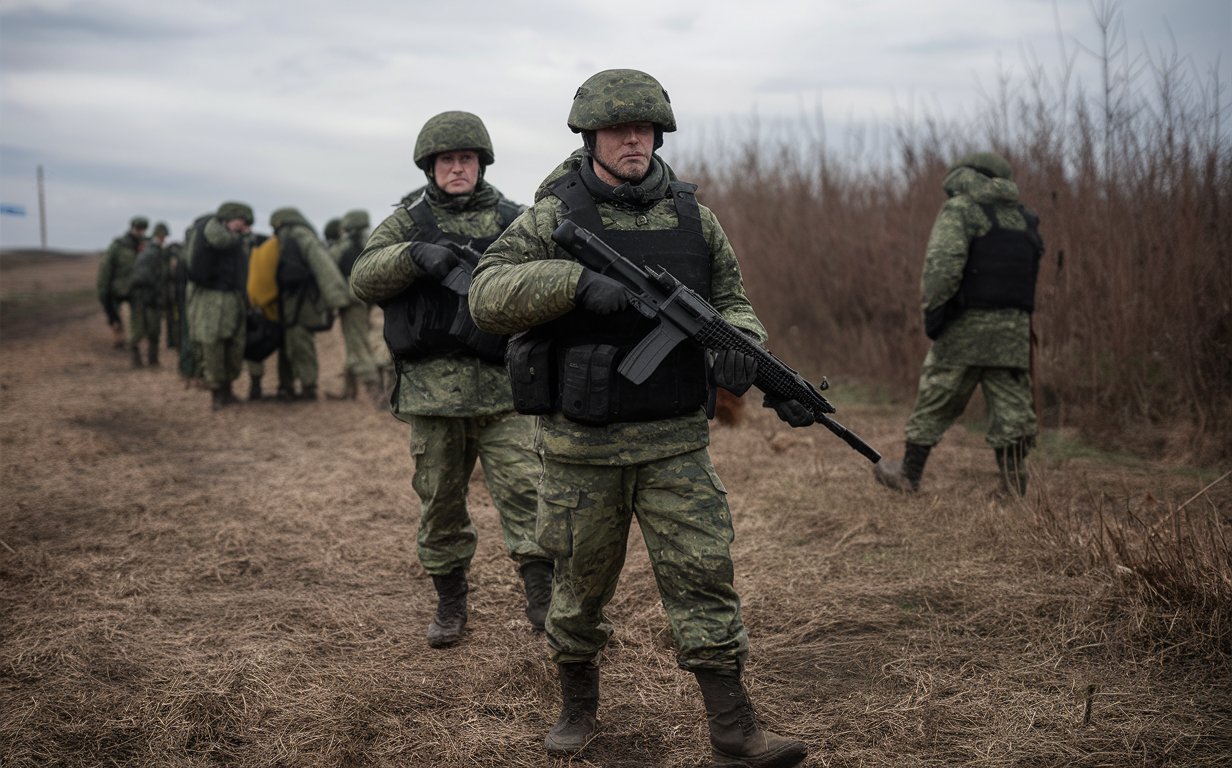Ukraine
Ukraine’s envoy to Pakistan appeals PM Khan to raise Ukraine conflict with Putin

Volodymyr Lakomov asks premier to play role to mitigate tensions as nuclear power
The Ukrainian ambassador to Pakistan appealed to Prime Minister Imran Khan to raise the issue of the Ukraine conflict during his meeting with Russian leadership in Moscow.
Addressing a press conference, Volodymyr Lakomov called on the premier to use this opportunity and play a role to mitigate rising tensions as a nuclear power. His comments come a day ahead of PM Khan’s scheduled visit to Russia on the invitation of President Vladimir Putin. The foreign office said in a statement that the premier will be accompanied by a high-level delegation, including members of the cabinet. It said that both countries enjoy friendly relations “marked by mutual respect, trust and convergence of views on a range of international and regional issues”.
Meanwhile, Putin has ordered that soldiers be deployed to the two pro-Russian separatist territories in Ukraine after he recognized them as independent late Monday. The comes after Russian president signed a decree that recognizes the he Donetsk People’s Republic (DPR) and Luhansk People’s Republic (LPR) in the Ukrainian provinces of Donetsk and Luhansk respectively as independent.
International news agency Reuters said that tanks and other military equipment were seen in the separatist controlled city of Donetsk following Putin’s order. The move was condemned by international quarters and sanctions from the United States.

Analysis
Urgent Weapons Aid to Ukraine: Analyzing the $1 Billion Pentagon Package and Its Impact on the Conflict and Geopolitical Landscape

Introduction
To strengthen Ukraine’s defense capabilities, the Pentagon has swiftly sent $1 billion worth of weaponry to Kyiv after President Biden signed an aid bill. The need for military aid is driven by the recent challenges faced by Ukrainian troops on the front lines. This article seeks to explore the implications of this aid package, its effect on the ongoing conflict, and the wider geopolitical ramifications.
Ukraine’s Military Struggles
Ukrainian forces have been grappling with intensified Russian aggression, resulting in significant casualties and territorial losses. The conflict, which began in 2014, has seen a resurgence in recent months, with Russian-backed separatists intensifying their offensive in eastern Ukraine. The Ukrainian military has been outgunned and outmanned, leading to the urgent need for military assistance from the United States and its allies.
The $1 Billion Aid Package
The $1 billion aid package approved by the U.S. Congress and signed by President Biden is a testament to the United States’ commitment to supporting Ukraine in its defense against Russian aggression. The package includes a range of weapons and military equipment, such as Javelin anti-tank missiles, artillery systems, and ammunition. The urgency to deliver these weapons to Ukraine reflects the dire situation on the ground and the need for immediate support.
Impact on the Conflict
The provision of advanced weapons systems to Ukraine is expected to significantly enhance its military capabilities, enabling it to better counter Russian-backed separatists’ offensives. The Javelin anti-tank missiles, in particular, have been hailed for their effectiveness in neutralizing Russian armor. The artillery systems and ammunition included in the aid package will also bolster Ukraine’s ability to defend its territory and potentially launch counter-offensives.
Geopolitical Consequences
The delivery of $1 billion in weapons to Ukraine is not without broader geopolitical implications. It marks an escalation in the United States’ involvement in the conflict, potentially straining its relations with Russia. The move also underscores the United States’ commitment to upholding international norms and defending democratic values, as Ukraine continues to fight for its territorial integrity and democratic governance.
Expert Opinions
According to John Herbst, a former U.S. ambassador to Ukraine and current director of the Eurasia Center at the Atlantic Council, the aid package is a “critical step” in supporting Ukraine’s defense efforts. He further stated that “these weapons will help Ukraine defend itself and deter further Russian aggression.”
However, not all experts share this optimistic view. Some argue that the provision of military aid could further inflame the conflict, potentially leading to a wider confrontation between the United States and Russia. Dmitri Trenin, director of the Carnegie Moscow Center, cautions that “the U.S. decision to supply Ukraine with weapons will only exacerbate tensions between Washington and Moscow.”
Conclusion
The Pentagon’s rapid delivery of $1 billion in weapons to Ukraine reflects the urgent need to support Ukrainian troops in their struggle against Russian-backed separatists. The aid package has the potential to significantly enhance Ukraine’s military capabilities, bolstering its ability to defend its territory and potentially launch counter-offensives. However, the move also carries broader geopolitical implications, potentially straining U.S.-Russia relations and raising the specter of a wider conflict. As the situation unfolds, it is crucial for policymakers and analysts to closely monitor the impact of this aid package and its implications for the ongoing conflict and the broader geopolitical landscape.
Analysis
Greece and Spain urged to donate air defence systems to Ukraine

EU leaders are urging Greece and Spain to provide Ukraine with air defence systems as Kyiv’s need is greater than theirs. This is in response to Kyiv’s urgent appeal to Western allies to provide seven additional air defence systems as reported by the Financial Times. Germany is the only country that has announced the supply of an additional Patriot system.

The pressure on Greece and Spain from their EU and NATO allies to provide more air defence systems to Ukraine is increasing. The urgency to enhance Ukraine’s air defence system comes after President Zelenskyy took a jab at Western allies’ “flagging political support” in the face of Russian aggression. The EU’s 27 leaders face mounting pressure to step up efforts to protect Ukraine’s skies from Russian airstrikes.
Table of Contents
EU’s Call for Defence Aid to Ukraine

The European Union (EU) is putting pressure on Greece and Spain to provide Ukraine with air defence systems. The EU hopes that Athens and Madrid will donate a shipment of air defence systems to Kyiv, whose need is greater than theirs.
Athens and Madrid’s Potential Contributions
According to the Financial Times, Greece and Spain are under intense pressure from their EU and NATO allies to provide more air defence systems to Ukraine. The EU and its member states have already mobilised €33.1 billion in military support for Ukraine, including €11.1 billion under the European Peace Facility. However, EU leaders believe that Athens and Madrid can do more to help Ukraine defend itself against potential Russian airstrikes.
Kyiv’s Urgent Need for Air Defence
Ukraine has been facing a military threat from Russia since 2014, when Moscow annexed Crimea and supported separatists in eastern Ukraine. The conflict has killed more than 13,000 people and displaced millions. Ukraine’s President, Volodymyr Zelensky, has been urging the EU to provide more military and economic aid to his country. He has also been calling on Athens and Madrid to donate air defence systems to Ukraine.
In conclusion, the EU’s call for defence aid to Ukraine is a clear indication of the bloc’s commitment to support Ukraine’s sovereignty and territorial integrity. The EU hopes that Athens and Madrid will respond to its call and donate air defence systems to Kyiv.
Military Analysis

Comparison of Defence Capabilities
Ukraine has been in a state of conflict with Russia since 2014, and the country is in dire need of air defence systems to protect its cities and infrastructure. Greece and Spain have been urged by their EU and NATO allies to donate air defence systems to Ukraine, as their need is greater than Greece and Spain’s.
Greece and Spain have modern air defence systems, including the Patriot and SAMP/T, respectively. Ukraine, on the other hand, has an outdated air defence system that is no match for Russia’s modern air force. The donation of air defence systems from Greece and Spain would significantly enhance Ukraine’s defence capabilities and deter Russia’s aggression in the region.
Impact on Greece and Spain’s Security
The donation of air defence systems to Ukraine would have a minimal impact on Greece and Spain’s security. Both countries have modern air defence systems, and the donation of a few systems would not significantly impact their defence capabilities. Furthermore, the donation would strengthen their relations with their EU and NATO allies, which is crucial in the current geopolitical climate.
It is worth noting that the donation of air defence systems to Ukraine could potentially strain Greece and Spain’s relations with Russia. However, given the current state of conflict between Ukraine and Russia, it is essential for Greece and Spain to prioritise their alliances with their EU and NATO allies and support Ukraine’s defence capabilities.
In conclusion, the donation of air defence systems to Ukraine by Greece and Spain would significantly enhance Ukraine’s defence capabilities and deter Russia’s aggression in the region. The donation would have a minimal impact on Greece and Spain’s security and would strengthen their relations with their EU and NATO allies.
Political Implications

EU Solidarity and Strategic Interests
The pressure on Greece and Spain to provide air defence systems to Ukraine highlights the EU’s solidarity with a country that has been facing territorial aggression from Russia. The EU’s strategic interests in Ukraine include the promotion of democracy, human rights, and the rule of law. The EU has been providing financial and technical assistance to Ukraine since the 2014 Maidan Revolution. The EU’s support for Ukraine has also been an important factor in the ongoing conflict between Ukraine and Russia.
Bilateral Relations with Ukraine
The EU’s pressure on Greece and Spain to provide air defence systems to Ukraine also reflects the importance of bilateral relations between the EU and Ukraine. The EU’s Eastern Partnership policy aims to strengthen relations with six Eastern European countries, including Ukraine. The EU has signed an Association Agreement with Ukraine, which includes a Deep and Comprehensive Free Trade Area, and a visa-free travel regime for Ukrainian citizens. The EU has also been supporting Ukraine’s reform efforts in areas such as the judiciary, public administration, and energy sector.
Greece and Spain’s donation of air defence systems to Ukraine would not only enhance Ukraine’s defence capabilities but also strengthen the EU’s relations with Ukraine. It would also send a strong message to Russia that the EU stands with Ukraine in the face of territorial aggression.
Logistical Challenges

Transport and Delivery of Systems
The transport and delivery of air defence systems from Greece and Spain to Ukraine pose logistical challenges due to the distance between the countries. The systems, which include Patriot and S-300 missile batteries, are bulky and require specialised transport vehicles. The transport process must also adhere to strict regulations and safety standards to ensure that the systems are not damaged during transit.
Integration into Ukrainian Defence
Once the air defence systems are delivered to Ukraine, they must be integrated into the country’s existing defence infrastructure. This process involves training Ukrainian personnel on how to operate the systems, as well as ensuring that the systems are compatible with Ukraine’s existing defence technology. Integration can be a time-consuming process, as it requires coordination between multiple agencies and personnel.
To address these challenges, EU leaders have urged Greece and Spain to expedite the shipment of air defence systems to Ukraine. The urgency is due to Kyiv’s greater need for air defence systems to protect its cities from potential Russian aggression. Despite the logistical challenges, both Greece and Spain have expressed their commitment to providing aid to Ukraine.
Public and International Response

Domestic Opinions in Greece and Spain
The pressure on Greece and Spain to provide Ukraine with air defence systems has sparked mixed reactions in the two countries. In Greece, there is a sense of reluctance to donate the systems, with some arguing that the country has its own security concerns to address. Meanwhile, in Spain, there is a growing sense of frustration at the EU’s demands, with many questioning why their country should be the one to provide the systems.
Despite these opinions, both countries have publicly expressed their willingness to help Ukraine. Greek Prime Minister Kyriakos Mitsotakis and his Spanish counterpart Pedro Sanchez have both stated that they are open to donating the systems, provided that certain conditions are met.
Global Perspective on EU’s Defence Support
The EU’s push for Greece and Spain to donate air defence systems to Ukraine has been met with mixed reactions from the international community. While some countries have expressed support for the move, others have raised concerns about the potential impact on regional stability.
The United States has been one of the most vocal supporters of the EU’s efforts, with President Joe Biden calling on Greece and Spain to “step up and provide the assistance that Ukraine needs”. Other NATO allies have also expressed support for the move, with many arguing that it is necessary to counter the threat posed by Russia.
However, some countries have raised concerns about the potential impact on regional stability. Russia has warned that any move to provide Ukraine with advanced weapons could lead to a dangerous escalation of the conflict, while China has called on all parties to exercise restraint and avoid actions that could lead to further instability in the region.
Overall, the international response to the EU’s push for Greece and Spain to donate air defence systems to Ukraine has been mixed, with some countries expressing support and others raising concerns about the potential impact on regional stability.
News
Russian Troops Advance: Ukraine’s Eastern Cities Brace for Impact

As Russian troops continue to advance towards Ukraine’s eastern cities, frontline communities are bracing themselves for the worst. With Moscow’s forces slowly pressing forward, life is draining out of these cities, leaving residents anxious and uncertain about what the future holds.

The situation in Ukraine’s eastern cities has been tense for years, with sporadic fighting between Ukrainian government forces and Russian-backed separatists. However, the recent escalation of violence has raised concerns that the conflict could spiral out of control, leading to a full-scale war between Ukraine and Russia.
Despite calls for a peaceful resolution to the conflict, tensions remain high as Russian troops continue to move towards Ukraine’s border. As the situation continues to unfold, residents of Ukraine’s eastern cities are left to wonder what the future holds for them and their families.
Table of Contents
Russian Military Advances

Moscow’s Strategy
The Russian military has been slowly advancing towards eastern cities in Ukraine, with Moscow’s forces pressing forward with a clear strategy in mind. The Russian government has claimed that they are only protecting Russian-speaking citizens in the region, but many experts believe that the ultimate goal is to annex the territory and expand Russian influence in the region.
One of the key tactics used by Moscow is the deployment of so-called “little green men” – Russian soldiers without insignia – to stir up unrest and create chaos in the region. This has been seen in previous annexations by Russia, including the annexation of Crimea in 2014.
Frontline Dynamics
As Russian troops advance, life is draining out of frontline communities in Ukraine. The situation is particularly dire in cities such as Donetsk and Luhansk, which have been at the center of the conflict since 2014. The ongoing violence has caused significant damage to infrastructure and has forced many residents to flee their homes.
The Ukrainian military has been fighting back against the Russian advance, but they are facing significant challenges. The Russian military is well-equipped and well-trained, and they have a clear advantage in terms of firepower. As a result, the Ukrainian military has been forced to resort to guerrilla tactics, including hit-and-run attacks on Russian convoys.
The situation in eastern Ukraine remains tense, with both sides continuing to engage in sporadic fighting. The international community has condemned Russia’s actions and has called for a peaceful resolution to the conflict, but it remains to be seen whether this will be possible.
Impact on Eastern Ukrainian Cities

As Russian troops continue to advance, the eastern cities of Ukraine are bracing for the worst. The slow but steady progress of Moscow’s forces is taking a heavy toll on the communities closest to the frontlines.
Civilian Challenges
The impact on civilians in these cities is significant. Many are living in fear of the violence that could erupt at any moment, with some already forced to flee their homes in search of safety. The ongoing conflict has disrupted essential services such as healthcare, education, and transportation, leaving residents struggling to meet their basic needs.
The threat of violence has also taken a toll on the mental health of those living in these communities. The constant fear and uncertainty have led to increased levels of stress and anxiety, making it difficult for people to go about their daily lives.
Economic Consequences
The economic consequences of the conflict are also severe. The ongoing violence has disrupted trade and commerce, leading to a sharp decline in economic activity. Many businesses have been forced to close, leaving thousands of people without work.
The disruption of essential services has also had a significant impact on the local economy. Healthcare facilities, schools, and transportation networks have all been severely affected, making it difficult for businesses to operate and for people to access the services they need.
Overall, the situation in eastern Ukraine is dire. With Russian troops continuing to advance, the future of these communities remains uncertain. The international community must act quickly to provide assistance and support to those affected by the conflict, and to work towards a peaceful resolution to the ongoing crisis.
International Responses

Diplomatic Efforts
The international community has expressed concern over the escalating conflict between Ukraine and Russia. The United Nations Security Council held an emergency meeting to discuss the situation and called for an immediate de-escalation of tensions. The European Union has also urged Russia to withdraw its troops and engage in dialogue with Ukraine.
In addition, several countries, including the United States, Canada, and the United Kingdom, have pledged their support to Ukraine. The US has promised to provide military aid to Ukraine, while Canada has announced sanctions against Russia.
Sanctions and Aid
The European Union has imposed economic sanctions on Russia in response to its actions in Ukraine. The sanctions target key sectors of the Russian economy, including energy, finance, and arms exports.
The EU has also provided financial aid to Ukraine to support its economy and help it deal with the humanitarian crisis caused by the conflict. The United States has also provided financial aid to Ukraine, as well as military assistance.
Overall, the international community is working to find a diplomatic solution to the conflict and support Ukraine in its efforts to defend its sovereignty and territorial integrity.
Future Projections

As the Russian troops continue to advance towards Ukraine’s eastern cities, the future looks uncertain for the frontline communities. The ongoing conflict has already caused significant damage to the region’s infrastructure, and the situation is likely to worsen as the fighting intensifies.
One of the major concerns is the impact on the local economy. The region’s industries, including mining and agriculture, have already been hit hard by the conflict, and the continued presence of Russian troops is likely to further disrupt trade and investment. This could lead to rising unemployment and a decline in living standards for those living in the affected areas.
There are also concerns about the humanitarian situation in the region. As the conflict intensifies, more and more people are being displaced from their homes, and many are struggling to access basic necessities such as food, water, and medical care. The ongoing violence is also taking a toll on the mental health of those living in the affected areas, with many experiencing trauma and anxiety.
In the coming months and years, it is likely that the situation in Ukraine’s eastern cities will remain volatile and unpredictable. The international community must work together to find a peaceful resolution to the conflict and provide support to those affected by the ongoing violence. Only through cooperation and dialogue can we hope to bring an end to this devastating conflict.
-

 Featured3 years ago
Featured3 years agoThe Right-Wing Politics in United States & The Capitol Hill Mayhem
-

 Elections 20242 months ago
Elections 20242 months agoAnalyzing Trump’s Super Tuesday Triumph and Nikki Haley’s Strategic Moves
-

 News2 years ago
News2 years agoPrioritizing health & education most effective way to improve socio-economic status: President
-

 China3 years ago
China3 years agoCoronavirus Pandemic and Global Response
-

 Canada3 years ago
Canada3 years agoSocio-Economic Implications of Canadian Border Closure With U.S
-

 Conflict3 years ago
Conflict3 years agoKashmir Lockdown, UNGA & Thereafter
-

 Democracy3 years ago
Democracy3 years agoMissing You! SPSC
-

 Democracy3 years ago
Democracy3 years agoPresident Dr Arif Alvi Confers Civil Awards on Independence Day
























